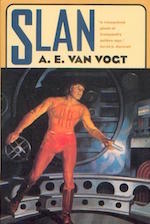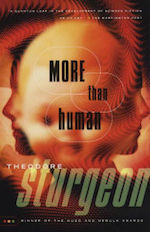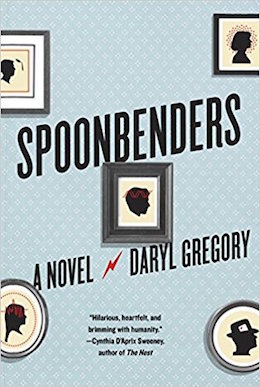Whatever happened to ESP?
Psi powers—telepathy, telekinesis, precognition, and other parapsychological activity—was one of the founding tropes of science fiction, up there with rocket ships, time travel, and aliens. John W. Campbell coined the term “psionics”—from psi and electronics—and encouraged his stable of authors to write about it. And so they did.
But after reaching maximum saturation in the 1950s, psionics began disappearing from SF in the 70s, became uncommon by the 90s, and are a rarity today. (That’s one of the reasons I wanted to write one. I miss them!) The five books below, as well as being some of my favorite novels, show how the subgenre evolved, and why I think it’s unlikely to go extinct.
The Ur Text: Slan by A.E. Van Vogt
 It’s hard to overstate the importance of Slan to science fiction. Van Vogt’s prose style is not to everyone’s taste (see Damon Knight’s infamous essay dismantling Van Vogt in In Search of Wonder), but the power is in its big idea: a hidden race of supermen, wielding awesome mind powers, is secretly controlling the world.
It’s hard to overstate the importance of Slan to science fiction. Van Vogt’s prose style is not to everyone’s taste (see Damon Knight’s infamous essay dismantling Van Vogt in In Search of Wonder), but the power is in its big idea: a hidden race of supermen, wielding awesome mind powers, is secretly controlling the world.
Slan, which was first serialized in 1940, established the idea that psi powers go hand in hand with the evolution of the human race. To paraphrase Bowie, you gotta make way for homo superior. Van Vogt’s ubermensch conspiracy resonated deeply, and perhaps not healthily. The early science fiction community embraced “fans are slans” exceptionalism—weren’t SF readers smarter and more special than the “mundanes?” Every psi story to follow had to wrestle with this yearning for a master race.
Psi as a Job: The Demolished Man by Alfred Bester
 Bester’s novel, which won the first Hugo in 1953, offers one solution to the superman problem: register and license them. In the 24th century there are many “espers,” from low-level class 3’s to powerful Class 1’s, and some of those Class 1’s want to rule the world. Lincoln Powell, a Class 1 esper detective, is chasing a murderer (and latent telepath) that he knows is guilty—Powell read his mind—but because evidence gained via telepathy is not admissible in court, he has to collect evidence the old-fashioned way. Great power, Bester argues, can be reined in by laws and society.
Bester’s novel, which won the first Hugo in 1953, offers one solution to the superman problem: register and license them. In the 24th century there are many “espers,” from low-level class 3’s to powerful Class 1’s, and some of those Class 1’s want to rule the world. Lincoln Powell, a Class 1 esper detective, is chasing a murderer (and latent telepath) that he knows is guilty—Powell read his mind—but because evidence gained via telepathy is not admissible in court, he has to collect evidence the old-fashioned way. Great power, Bester argues, can be reined in by laws and society.
It’s a Family Thing: Mind of My Mind by Octavia Butler
 This 1977 novel, the second book in the Patternist series, was the first Octavia Butler novel I read, and it was thrilling. The story is about Mary, a latent telepath who is part of a breeding program orchestrated by a 4,000-year-old immortal, Doro, whose mind hops from body to body. Mary becomes the most powerful psionic in the world (there are flying telekinetics, too) by linking with first six, then over a thousand telepaths in what she calls a Pattern.
This 1977 novel, the second book in the Patternist series, was the first Octavia Butler novel I read, and it was thrilling. The story is about Mary, a latent telepath who is part of a breeding program orchestrated by a 4,000-year-old immortal, Doro, whose mind hops from body to body. Mary becomes the most powerful psionic in the world (there are flying telekinetics, too) by linking with first six, then over a thousand telepaths in what she calls a Pattern.
But typical for Butler, Mary doesn’t want to rule the world; she wants to protect her family, and this community of Patternists. When Doro, feeling threatened, attacks Mary, the group kills him. Butler demonstrates that power for the sake of power is a hollow goal.
Making it Personal: The Hollow Man by Dan Simmons
 Speaking of hollow… Jeremy, the protagonist of Simmon’s 1992 novel, is a grieving telepath who was married to a woman who shared his powers. When she dies, he can no longer keep out the “neurobabble” of other minds, and so goes on the road, seeking isolation.
Speaking of hollow… Jeremy, the protagonist of Simmon’s 1992 novel, is a grieving telepath who was married to a woman who shared his powers. When she dies, he can no longer keep out the “neurobabble” of other minds, and so goes on the road, seeking isolation.
As in the best SF, metaphors are artfully literalized. The marriage of true minds has dissolved, and Jeremy’s become yet another widower trying withdraw from the world. Then he meets a sociopathic killer whose mind is full of static, a person literally disconnected from all human connection. And Jeremy hears a “voice” calling him, a new telepath who needs his help. The purpose of Jeremy’s life is not to save the world or create a new race: it’s to save one child.
The Next Step in Psi: More than Human by Theodore Sturgeon
 Just to prove that there’s no ultimate psi novel, no master text that this subgenre will evolve into, here’s what I consider a timeless classic in the field. Written over fifty years ago, More than Human is about a group of damaged yet powerful people who gradually find each other. There’s a troubled young man with telepathic powers, a telekinetic girl, two mute twins with the ability to teleport, and Baby, a toddler super-genius. They become more than a family; they’re a new kind of organism: homo gestalt. The organism becomes whole only when it’s joined by a normal man, who serves as their conscience. This new race won’t dominate humans, but work with them.
Just to prove that there’s no ultimate psi novel, no master text that this subgenre will evolve into, here’s what I consider a timeless classic in the field. Written over fifty years ago, More than Human is about a group of damaged yet powerful people who gradually find each other. There’s a troubled young man with telepathic powers, a telekinetic girl, two mute twins with the ability to teleport, and Baby, a toddler super-genius. They become more than a family; they’re a new kind of organism: homo gestalt. The organism becomes whole only when it’s joined by a normal man, who serves as their conscience. This new race won’t dominate humans, but work with them.
More than Human is still finding readers, partly because the creation of homo gestalt—like Butler’s Patternists and the improvised family in Simmons’s novel—captures the way the world feels when we’ve finally found our family. And that’s why psi novels, though they may never again be as popular as they were in the 50’s, will continue to be written. They’re excellent vehicles for showing that mysterious process by which we come together, each of us with an array of abilities and dysfunctions that are mostly invisible to the outside world, and become a little stronger than we were alone. Also? Psionics is just plain cool.
Top image: cover art for French edition of Slan (J’ai Lu, 1977); illustration by Jean Mascii.
 Daryl Gregory’s latest novel is Spoonbenders, about a family of down-on-their-luck psychics, out now from Knopf. Recent work includes the novels Afterparty and Harrison Squared, and the novella “We Are All Completely Fine,” which won the World Fantasy Award and the Shirley Jackson Award. Daryl lives and bends cutlery in Oakland, California.
Daryl Gregory’s latest novel is Spoonbenders, about a family of down-on-their-luck psychics, out now from Knopf. Recent work includes the novels Afterparty and Harrison Squared, and the novella “We Are All Completely Fine,” which won the World Fantasy Award and the Shirley Jackson Award. Daryl lives and bends cutlery in Oakland, California.










